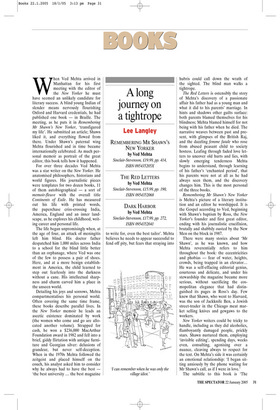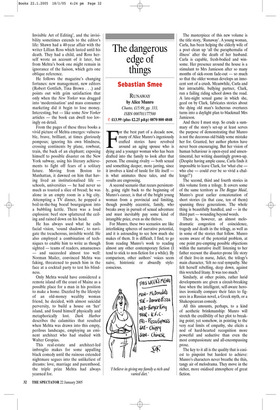A long journey on a tightrope
Lee Langley
REMEMBERING MR SHAWN’S NEW YORKER by Ved Mehta Sinclair-Stevenson, £19.99, pp. 414, ISBN 095435205X THE RED LETTERS by Ved Mehta Sinclair-Stevenson, £15.99, pp. 190, ISBN 0954352068 DARK HARBOR by Ved Mehta Sinclair-Stevenson, £17.99, pp. 272, ISBN 0954352041 to write for, even the best tailor’. Mehta believes he needs to appear successful to fend off pity, but fears that straying into When Ved Mehta arrived in Manhattan for his first meeting with the editor of the New Yorker he must have seemed an unlikely candidate for literary success. A blind young Indian of slender means nervously flourishing Oxford and Harvard credentials, he had published one book — in Braille. The meeting, as he puts it in Remembering Mr Shawn’s New Yorker, ‘transfigured my life’. He submitted an article; Shawn liked it, and everything flowed from there. Under Shawn’s paternal wing Mehta flourished and in time became internationally celebrated. As much personal memoir as portrait of the great editor, this book tells how it happened.
For over three decades Ved Mehta was a star writer on the New Yorker. He anatomised philosophers, historians and world figures. His journalistic pieces were templates for two dozen books, 11 of them autobiographical — a sort of memoir-fleuve with the overall title Continents of Exile. He has measured out his life with printed words, the paperchase criss-crossing India, America, England and an inner landscape, as he explores his childhood, writing career and personal life.
The life began unpromisingly when, at the age of four, an attack of meningitis left him blind. His doctor father despatched him 1,000 miles across India to a school for the blind little better than an orphanage, where Ved was one of the few to possess a pair of shoes. Here, and at a more benign establishment in America, the child learned to step out fearlessly into the darkness without a cane. His intellectual sharpness and charm carved him a place in the unseen world.
Detailing his joys and sorrows, Mehta compartmentalises his personal world. Often covering the same time frame, these books describe parallel lives. In the New Yorker memoir he leads an ascetic existence dominated by work (the women who come and go are allocated another volume). Strapped for cash, he won a $236,000 MacArthur Foundation award in 1982 and fell into a brief, giddy flirtation with antique furniture and Georgian silver: delusions of grandeur, but never self-deception. When in the 1970s Mehta followed the zeitgeist and placed himself on the couch, his analyst asked him to consider why he always had to have the best — ‘the best university ... the best magazine hubris could call down the wrath of the sighted. The blind man walks a tightrope.
The Red Letters is ostensibly the story of Mehta’s discovery of a passionate affair his father had as a young man and what it did to his parents’ marriage. In hints and shadows other guilts surface: both parents blamed themselves for his blindness; Mehta blamed himself for not being with his father when he died. The narrative weaves between past and present, with glimpses of the British Raj, and the dazzling femme fatale who rose from abused peasant child to society hostess. Leafing through faded love letters to uncover old hurts and lies, with slowly emerging tenderness Mehta begins to understand, through learning of his father’s ‘enchanted period’, that his parents were not at all as he had always seen them, and the discovery changes him. This is the most personal of the three books.
Remembering Mr Shawn’s New Yorker is Mehta’s picture of a literary institution and an editor he worshipped. It is the Gospel according to Ved, beginning with Shawn’s baptism by Ross, the New Yorker’s founder and first great editor, ending with his journalistic crucifixion, brutally and shabbily ousted by the New Men on the block in 1987.
There were many stories about ‘Mr Shawn’, as he was known, and how Mehta reverentially refers to him throughout the book: the eccentricities and phobias — fear of water, heights, crowds, being trapped in an elevator... He was a self-effacing editorial genius, courteous and delicate, and under his stewardship the magazine became more serious, without sacrificing the cosmopolitan elegance that had distinguished its pages in Ross’s day. Few knew that Shawn, who went to Harvard, was the son of Jackknife Ben, a Jewish street-trader in the Chicago meat market selling knives and gewgaws to the workers.
New Yorker writers could be tricky to handle, including as they did alcoholics, flamboyantly damaged people, prickly stars. Shawn nurtured them, employing ‘invisible editing’, spending days, weeks even, consulting, agonising over a nuance, cleaving always to respect for the text. On Mehta’s side it was certainly an emotional relationship: ‘I began sitting anxiously by the phone waiting for Mr Shawn’s call, as if I were in love.’ The subtitle to this book is ‘The Invisible Art of Editing’, and the invisibility sometimes extends to the editor’s life: Shawn had a 40-year affair with the writer Lillian Ross which lasted until his death. They had a child, and Ross herself wrote an account of it later, but from Mehta’s book one might remain in ignorance of the liaison, which gets one oblique reference.
He follows the magazine’s changing fortunes: new management, new editors (Robert Gottlieb, Tina Brown . . .) and points out with grim satisfaction that only when the New Yorker was dragged into ‘modernisation’ and mass consumer marketing did it begin to lose money. Interesting, but — like some New Yorker articles — the book can dwell too lovingly on detail.
From the pages of these three books a vivid picture of Mehta emerges: vulnerable, brave, brilliant, at times gloriously pompous; ignoring his own blindness, crossing continents by plane, rowboat, train, the back of an elephant; exposing himself to possible disaster on the New York subway, using his literary achievements to fight off fears of a solitary future. Moving from Boston to Manhattan, it dawned on him that having lived an institutionalised life schools, universities — he had never so much as toasted a slice of bread; he was alone in an empty room in a big city. Attempting a TV dinner, he popped a boil-in-the-bag boeuf bourguignon into a bubbling kettle. There was a loud explosion: beef stew splattered the ceiling and rained down on his head.
He has always used what he calls facial vision, ‘sound shadows’, to navigate the treacherous, invisible world. He also employed a combination of techniques to enable him to write as though sighted — teams of readers, amanuenses — and succeeded almost too well: Norman Mailer, convinced Mehta was faking, threatened to punch him in the face at a cocktail party to test his blindness.
Only Mehta would have considered a remote island off the coast of Maine as a possible place for a man in his position to make a home. Dazzled by the lifestyle of an old-money wealthy woman friend, he decided, with almost suicidal perversity, to build a house on ‘her’ island, and found himself physically and metaphorically lost. Dark Harbor describes the calamities that resulted when Mehta was drawn into this empty, perilous landscape, employing an eminent architect who had studied with Walter Gropius.
This real-estate and architect-led imbroglio makes for some appalling black comedy until the ruinous extended nightmare segues into the unlikeliest of dreams: love, marriage and parenthood, the triple prize Mehta had always yearned for.














































 Previous page
Previous page